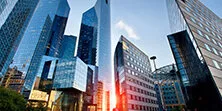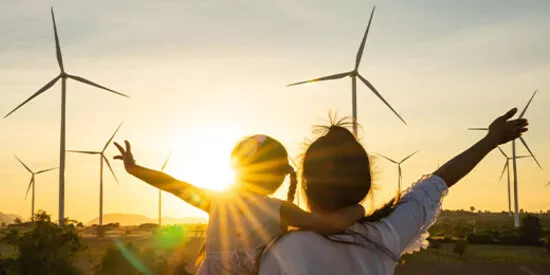
Korea’s energy transition can be its next economic miracle
A dazzling economic and exporting success story, Korea can maintain its momentum if its companies adopt greener practices.
From post-war reconstruction in the 1950s to its emergence as an advanced economy in the 2020s, Korea’s development stands as a modern miracle. Its electronics, auto and consumer brands are ubiquitous across the world.
The country’s exports of goods and services have soared to US$803.59 billion last year, or 48.3% of GDP, from just US$24.47 billion in 1983 (27.9% of GDP). It is now the world’s sixth biggest exporter.
In the 40 years since Societe Generale set up a presence there, Korea has recorded explosive growth to become the world’s 12th largest economy and a technology-exporting powerhouse.
This transformation was initially driven by traditional industries like shipbuilding, steelmaking, construction equipment and chemicals, and these sectors are still vital to the Korean economy. But to build on this success story, Korea is now tilting its economy towards low-carbon industries that are well placed to prosper in the global energy transition.
Net zero imperative
Korean companies across the board, whether in heavy industry or the ‘new economy’, have an opportunity to thrive by plotting their path to net zero emissions as rapidly as possible. Those that do so will not only help tackle climate change but also put themselves at a competitive advantage, particularly given the country’s strength as an exporter.
After all, expectations are rising globally among consumers, corporate buyers, investors and governments around sustainable business practices. Tightening regulations on environmental disclosure in markets like the EU and UK mean companies that move to measure, report on and reduce their emissions could attract more foreign investment and improve their standing.
Korea Inc can count on a supportive environment for action. The country’s Financial Services Commission has acknowledged the need to improve ESG disclosure, and is looking to introduce mandatory reporting for listed companies after 2026. This is in line with Seoul’s commitment to
achieve net-zero emissions by 2050 – it was the first East Asian government to make this pledge.
Capital challenges
Of course, the transition to greener operations and more sustainable supply chains – and reporting on progress towards these goals – requires time, effort and capital.
Businesses can shrink their carbon footprint in various ways: switching to renewable energy, reducing waste or using more fuel-efficient methods of delivery. Often companies, especially smaller ones, need advice and funding to implement emissions-reduction strategies.
There are multiple financing methods available, from traditional to newer types, including green, social, sustainability and sustainability-linked (GSSS) bonds and loans. Close to half (42%) of public bond issuance in Korea’s debt capital markets is related to ESG projects in 2023, year-to-date, and social bonds are a particular highlight, accounting for some 50% of GSSS issuance. This points to huge potential for green bonds issuance to catch up with other markets in Asia.
Societe Generale has worked with Korean financial institutions and corporates to issue green, social and sustainable bonds totalling US$22.4 billion equivalent, and continues to support the country’s energy transition through major financings.
In April this year, the bank partnered with the Export-Import Bank of Korea (KEXIM) on a 12-year post-delivery financing that helped a major global shipping company to modernize its fleet.
Societe Generale also supported a landmark green energy financing in Korea in 2022, acting as mandated lead arranger and technical and environmental bank for the 99 megawatt Jeonnam I offshore wind project, developed by SK E&S and Copenhagen Infrastructure Partners. Expected to be the first commercial-scale offshore wind farm to go into operation in 2024, the joint venture project introduced international best practices in a sector that will contribute to Korea’s ambitious renewable energy targets.
Setting the sustainability pace
What’s more, Societe Generale has deployed its deep structuring experience to arrange more tailored ESG-focused transactions.
In 2022, for instance, the bank helped put together an offering of sustainability asset-backed securities (ABS) for Hyundai Card, the credit card affiliate of Korea’s Hyundai Motor Group.
The KRW 350 billion (EUR 259 million) deal was the company’s first sustainability securitisation, demonstrating the benefits of integrating ESG into structured financing.
The transaction was also Societe Generale’s first sustainability ABS globally, combining both green and social criteria. The proceeds went to financing to support the sale of zero-emission electric vehicles and to financial services for lower-to-moderate income Hyundai Card members.
By adopting sustainable practices across the entire value chain, companies like Hyundai – Korea’s largest car maker – can make a profound impact. Businesses that display sustainability leadership will align themselves with the regulatory direction early and be better positioned commercially and reputationally with both investors and overseas customers.
Ultimately, if Korea’s corporates can further increase their focus on sustainable action and finance, the country should maintain its leading position as an exporter and a key part of global supply chains, despite rising competition from its Asian peers.
1. https://www.fsc.go.kr/eng/pr010101/80913
2. https://www.societegenerale.asia/en/newsroom/success-stories/success-stories-details/news/sustainability-financing-support-the-sale-zero-emission-electric-vehicles-and-lower-income-people/

日本のエネルギー・トランジションに向けて「東」と「西」を結ぶ
昨年ソシエテ・ジェネラルがグローバルロードショーの一環として開催した「ポジティブ・インパクト・デー」の東京会場では、日本の脱炭素化政策と国際的なパートナーとしての役割について、最新の動向を踏まえた活発な議論がなされました。

2024年第4四半期および2024年通期決算
パリ、2025年2月6日





